Farewell
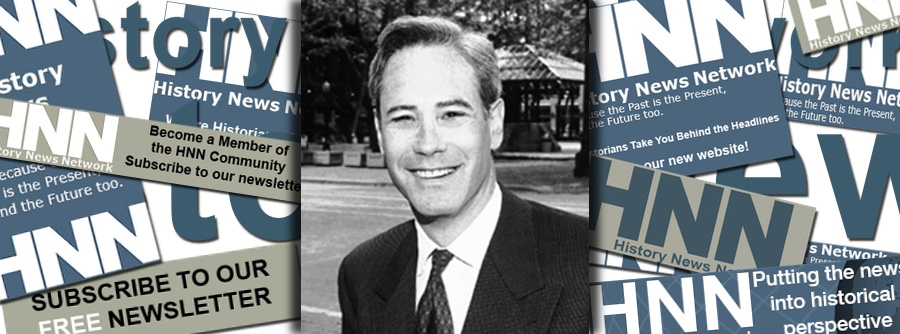
An interview with HNN publisher and founder Rick Shenkman. He is retiring at the end of 2018 when the website will be taken over by George Washington University under Kyla Sommers.
MAH: Rick, you have a vita of which any professor of history would be proud: best-selling author; presidential historian; contributor to the NBC Today Show; producer, writer, and host of a program on The Learning Channel; journalistic lecturer; and founder and editor of History News Network; among other things I’ve failed to mention. All such things in the interest of advancing our appreciation of history. What got you interested in history?
RS: I always liked history in school, a love I inherited from my mother, I’m sure. She loved history and politics.
I was better in history than other subjects in school, so that had something to do with my liking history. You like a subject in which you do well.
But until I was in high school I didn’t really excel in any subject in school. Then one day, in the summer of 1970, in-between my sophomore and junior years, I happened to walk into a bookstore in Ridgewood, NJ, which was next to the town I grew-up in—a town with a funny name, Ho-Ho-Kus—and happened upon the paperback edition of Richard Hofstadter’s The Age of Reform. I think I was drawn to the striking red, white and blue cover. It cost just $1.65 and I bought it. It was a snap decision and it changed my life.
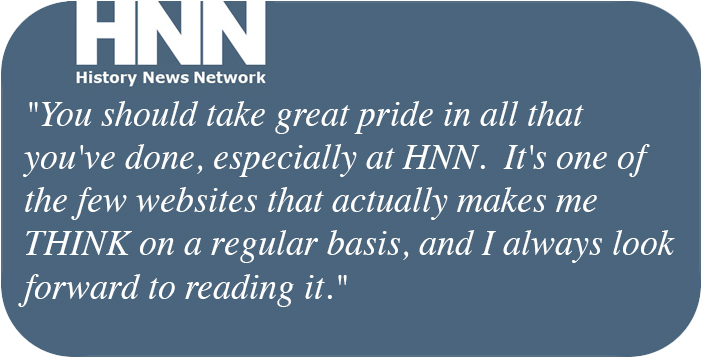
I devoured the book in four days. From that moment on I was hooked. Hofstadter was the match that lighted a fire that burns to this day. I think of it as an intellectual awakening. It made me realize there are complicated forces that drive human behavior and by studying documents you can figure out what makes humans behave the way they do.
I have had only one other intellectual awakening like this. That came when I read Daniel Kahneman’s Thinking Fast & Slow (2011). That set me on a path I am still on today, which is to understand how our neural engineering drives the decisions we make.
After finishing The Age of Reform I went on to all of his other books, reading almost all of them by the end of high school. (A school administrator, hearing of my achievements in history called me into his office. He was skeptical that I had read all these books so he grilled me about them. Apparently, I passed muster. In June 1972 I was selected as Junior Rotarian of the Month and given the high school history award. For somebody who'd done middling work for most of my school career these were heady times. Junior Rotarian of the Month!)
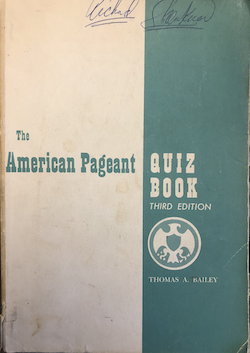 Another influence was Thomas Bailey, the Stanford historian who wrote The American Pageant. That was the school textbook we’d be reading the following year in U.S. History I. I ordered a copy from the publisher, DC Heath, and basically memorized it by the time school began in the fall. By mistake they sent me the teacher’s Quiz Book along with the textbook so I was able to test myself as I went along. I have always been grateful for this blunder.
Another influence was Thomas Bailey, the Stanford historian who wrote The American Pageant. That was the school textbook we’d be reading the following year in U.S. History I. I ordered a copy from the publisher, DC Heath, and basically memorized it by the time school began in the fall. By mistake they sent me the teacher’s Quiz Book along with the textbook so I was able to test myself as I went along. I have always been grateful for this blunder.
When I showed up for class in September I told my teacher I had read the textbook cover to cover and wanted to do independent study. He quizzed me to make sure I really knew the material and I passed. I spent the year writing an 85 page term paper on the agrarian movement. The next year they let me do another independent study project, this time on the liberal and conservative tradition in American history. This term paper ran 163 pages. I even got it bound.
Because I had never been a good student until this point I came to regard history and my identity as one. This feeling has persisted to this day.
I should also mention three of my high school teachers. They loved my enthusiasm for history and nurtured it. I owe them a great deal. Two of the teachers were historians. I audited their classes when I was given an exemption from History I and II. Milo Okkema was a conservative who tutored students in the Great Books. Harry Ahearn was a classic New Dealer who lionized FDR. Then there was Frank Asher, who taught sociology and Afro-American History (yes, that's what it was called back then). He was an old leftist who was reputed to have once been a member of the Communist Party. Going from class to class forced me to confront the fact that history is an argument without easy answers, which helped me avoid the impression left by Bailey’s textbook that history consists of a set of facts one commits to memory.
I came across a wonderful quote from Henry Steele Commager, which I used at the front of one of my two big term papers: "You become a historian not so much because you're interested in history, but because you admire people who are interested in history." This captures the human element in my love of history. I loved those teachers of mine and because they thought history was important. I thought it was too.
MAH: Hmm, I can relate. I had a similar experience while reading Aristotle’s Politics very early in the morning while working as a security guard at a movie complex, under construction. Yet I never met Aristotle. Okay, a right turn! Having over the years read so many historians with so many different approaches to history, you certainly have developed thoughts on historiography. What is the Shenkmanian philosophy of history? Is imagination important?
RS: To begin with, I’m not much of a philosopher. One reason I decided to become a historian was because historians generally resist philosophizing. We prefer the concrete. And so do I. We are wary of philosophy. Down that rabbit hole is Spenglerism, Toynebeeism, and other isms. I am downright allergic to that sort of thing. History isn’t a science and there aren’t any laws to history. You study the facts as best as you can accumulate them and look for patterns. You don’t start with a pattern and work backwards.
But having said that I think it’s rather foolish to think that historians lack a philosophy. Like R.G. Collingwood, whom my Vassar professors exposed me to some four decades ago, there are a set of assumptions historians make about the world that amount to a philosophy even if we don’t strictly call it that.

First and foremost is the belief in contingency, the idea that consequential things often happen in pell-mell fashion. We don’t believe that the order of the universe is decided at the direction of god or man. Shit happens, as the old sixties saying has it.
Second, the world is complicated. As a result of studying history I try to never let the words “it’s simple, really” cross my lips. Nothing of consequence is ever simple. Studying history cures one of the curse of oversimplifying. Okay, got that off my chest!
You mention imagination. It’s vital to the study of history. Anybody who has ever faced a blank piece of paper when writing a story knows this. The facts don’t add up to a story by themselves. One has to arrange them in a certain order for the story to emerge. That takes imagination.
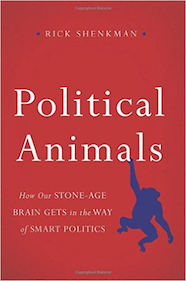 Now having said all this I have got to admit that in the last decade, as I delved into the research for Political Animals: How Our Stone-Age Brain Gets in the Way of Smart Politics (Basic Books, 2016) I came away with a new respect for the insights of social scientists. They start with a hunch, run experiments, and write up their findings in a report. I have derived a great deal from studying their work. It’s given me a new way to look at history. I think that historians make a mistake in writing off the work of social scientists and many historians do this.
Now having said all this I have got to admit that in the last decade, as I delved into the research for Political Animals: How Our Stone-Age Brain Gets in the Way of Smart Politics (Basic Books, 2016) I came away with a new respect for the insights of social scientists. They start with a hunch, run experiments, and write up their findings in a report. I have derived a great deal from studying their work. It’s given me a new way to look at history. I think that historians make a mistake in writing off the work of social scientists and many historians do this.
I’ll give you a quick example. The Theory of Affective Intelligence posits that when people become anxious owing to a mismatch between their perceptions of the world and the way things actually work they pause to try to resolve the dissonance they feel. In this moment they become ready to reconsider their commitments. Example. Say you voted for Richard Nixon in 1972 and then followed the news about Watergate. At some point the disclosures no doubt made you feel queasy enough to wonder if perhaps Nixon was the snake his enemies always insisted he was. That queasy feeling can be scientifically measured in your brain. Knowing this has changed how I think about turning points in history when people decide to change their minds. It makes me look for signs of the moment when, as a social scientist friend of mine puts it, "the burden of hanging on to a belief becomes greater than the burden of changing it."
Another thing I’ve learned from the social scientists is that it’s wrong to think of humans as blank slates. When I was in school in the 1970s this was bien pensant. I think too many historians remain wedded to this belief. But it’s bunk. I am convinced by Evolutionary Psychology that a grammar of human behavior is embedded in our brains. It doesn’t govern all of our reactions and it certainly doesn’t help us predict the course history takes. But we make a grievous mistake if we think we just pop into this world willy-nilly to be shaped wholly by our culture. This is nonsense.
My simplest example is storytelling. All humans tell stories about themselves and their societies. We aren’t computers. Scientists have even found specific places in the brain where we invent stories to explain what we’re experiencing. Experiments with split-brain patients (people whose left and right hemispheres were literally separated to prevent epileptic seizures) show that when the left-hand literally doesn’t know what the right-hand is doing the brain will make up a story out of whole cloth to make what the right-hand is doing comprehensible. (I write about this in Political Animals.)
So I guess I do have a philosophy of history of sorts if any of what I’ve been saying makes sense to you.
MAH: You know of my profound respect for Thomas Jefferson. Jefferson asked to have inscribed on his tombstone the following: “Here was buried Thomas Jefferson, Author of the Declaration of Independence, Of the Statute of Virginia for religious freedom & Father of the University of Virginia.” What three things would you want inscribed on your tombstone once you pass. I’m not saying you’re old, or anything like that, but I’m just asking something like this: Of what three accomplishments are you most proud?
RS: I understand entirely your use of Jefferson as a frame of reference but it’s practically struck me dumb. Jefferson had so many achievements from which to pick it was meaningful to ask him to make a selection. Me—not so much! I have written one book I am really proud of—Political Animals—and established a website—this one—I hope will endure for awhile. As a reporter in Utah I stopped an out-of-touch billionaire from becoming governor and exposed a power company's corruption (which resulted in a rebate to ratepayers of more than 60 million dollars). We all play our part. This is mine.
MAH: Okay, the website—History News Network—and that’s the reason why I asked you if you’d let me interview you for HNN for your final page. It’s my way—and I’m sure all others reading this will agree—it’s my way of thanking you for your selfless dedication to history through the website. Why did you decide to take on such a large project? What were your aims? Have they been met? Exceeded?
RS: Like the historian I am, I have a story to tell that explains my answer. And hey, thanks for asking!
HNN began with a grievance. During the impeachment of Bill Clinton, you may recall, there were cries that Congress censor him rather than impeach him. In their reporting the media kept citing the censorship of Andrew Jackson and sometimes John Tyler. I was doing research at the time for my book,Presidential Ambition, and knew that James Buchanan had been censured too. I tried to contact various media outlets like ABC News and the New York Times to let them know about this forgotten moment in our history but got nowhere. I fumed about this. It seemed crazy that journalists would ignore a historian who had valuable information to add to an important debate. (Here is the article I wound up writing about censure.)
This was the genesis of HNN. It seemed obvious to me that historians should have a national platform to help journalists and the public make sense of the news. I set out to create one in 2000. (We went online in 2001.)
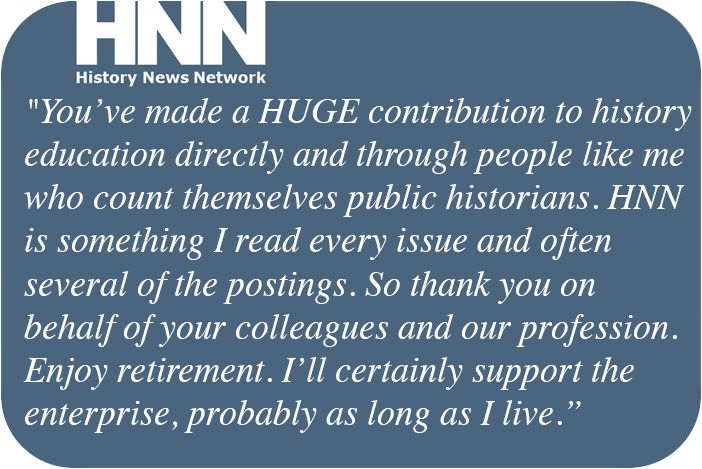
I hope we’ve fulfilled the mission. We certainly have carved out a nice niche in the political firmament. Scores of journalists regularly turn to HNN’s vast archive of around 10,000 original articles. Each year the website draws more than four million page views, so somebody’s reading us!
Along the way I have made innumerable friends with historians across the world. I treasure these human relationships. What a wonderful job I have had. Each day I have gotten the chance to commune with intellectuals of the highest caliber and broadest sympathies. Hanging out with people who are your superior in so many ways is inspiring. As my father, a great tennis player used to say, if you want to improve your game play with people who are better than you. At HNN that’s what I’ve been doing.
MAH: A final question. As a man of large aims and large accomplishments, I don’t see you reclining on a Lay-Z-Boy, sipping Kentucky bourbon, and watching Oprah reruns. What do you plan on doing in retirement?
RS: Well put! I plan on continuing to do lectures based on Political Animals. I plan on reading fiction for the first time in 40 years, going back to Hemingway and Fitzgerald to start. I also plan on reading more social science and science books. My reading list, as I just discovered when I did a tally, includes about 200 books. Egads! That’s several years work right there! And for fun I’ll keep on reading history books and biographies. Throw in travel with my husband and biking and swimming and you have a full life.
Thank you for asking all these questions. I am grateful to you for doing so. I wasn’t sure how to end my long tenure at HNN (about 18 years). You solved that problem!
Au revoir!